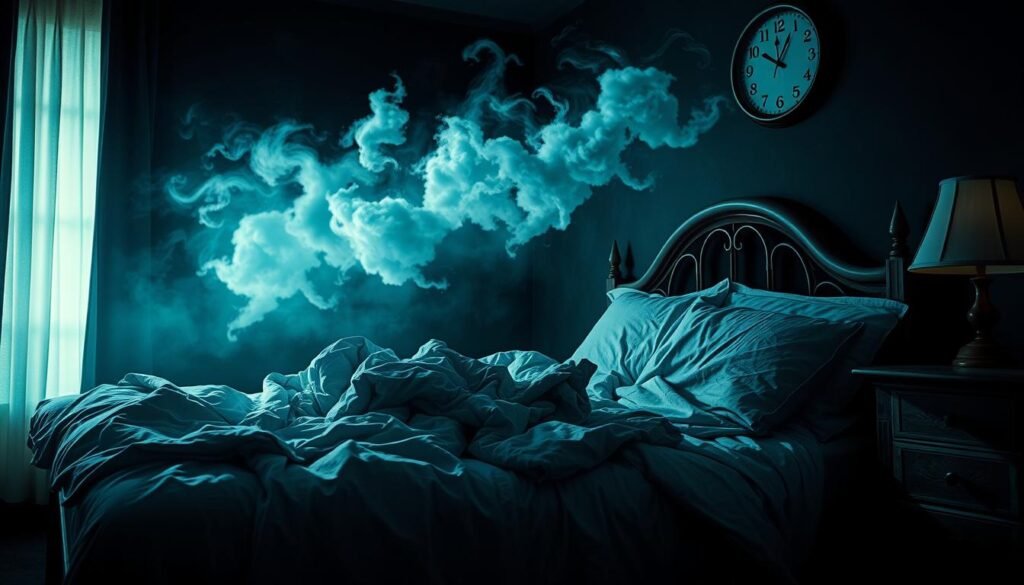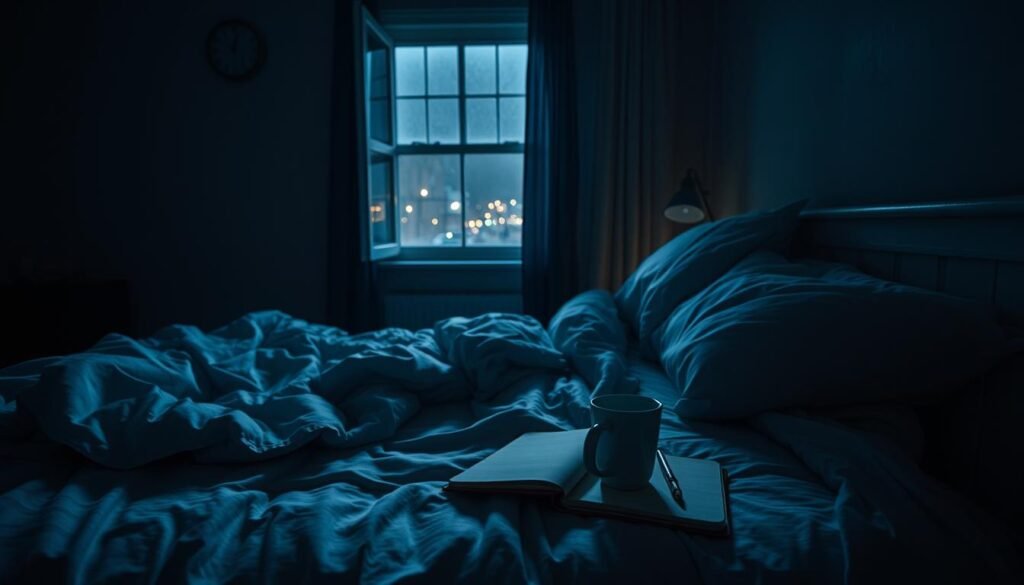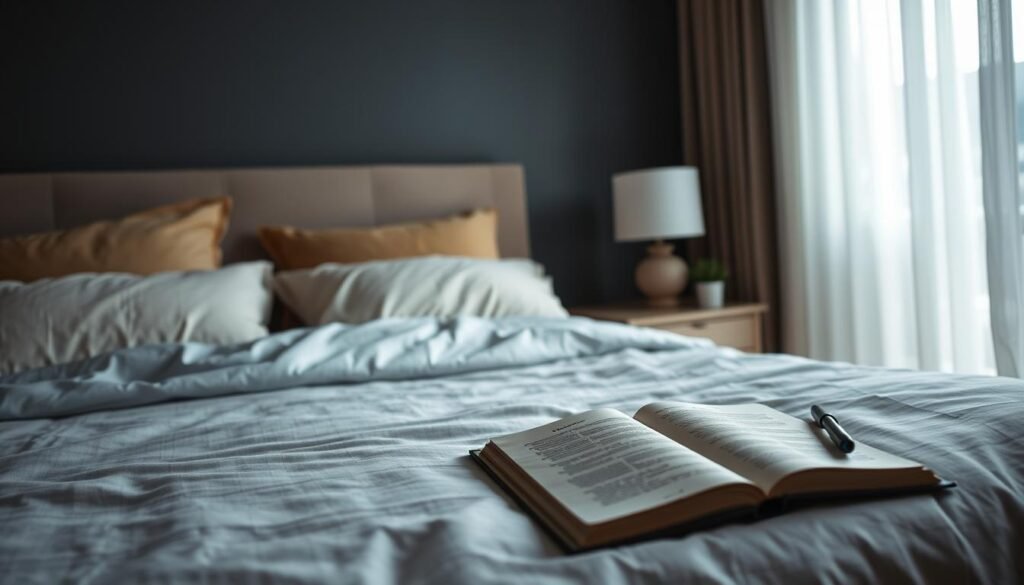Did you know that nearly 9 in 10 people with depression also have insomnia? This fact shows how crucial it is to find good ways to handle insomnia when depressed. These issues often make each other worse and can really affect someone’s life. It’s very important to understand and deal with this link to feel better and sleep well.
We’re going to look at different methods and tips to tackle sleep problems that come with depression. We’ll talk about therapies like cognitive behavioral therapy, making changes in your day-to-day life, and why sleeping well matters. You should always talk to a doctor to get advice that fits you. For more information, visit treating insomnia and depression.
Key Takeaways
- Insomnia is common in those who are depressed, affecting nearly 9 out of 10 people.
- Cognitive behavioral therapy (CBT) is usually the first suggested way to treat insomnia.
- Making lifestyle adjustments like sleeping on a schedule and avoiding caffeine can help lessen symptoms.
- Depression medicines, like SSRIs and SNRIs, may help you sleep better too.
- It’s crucial to practice good sleep habits to manage sleep problems well.
- Talking with healthcare providers ensures you get a treatment plan that’s right for both your sleep and mental health.
The Link Between Insomnia and Depression
Insomnia and depression are closely linked, forming a complex and bidirectional relationship. It’s common for someone with one condition to also face the other. This creates a tough cycle. Research shows that about 90% of depression patients struggle with sleep. This strong overlap affects their health and daily life.
The Bidirectional Relationship
Nearly 1 in 3 adults in the U.S. have insomnia, with more women affected than men. Insomnia can lead to depression, and depression can worsen insomnia. For example, two-thirds of those with major depression struggle with sleep. Insomnia increases the risk of developing or relapsing into major depressive disorder. It’s crucial to address sleep problems early.
How Sleep Impacts Mental Health
Poor sleep affects mood and thinking. Adults need 7 to 9 hours of sleep for good mental health, but most get around 6.9 hours. This lack of sleep can make depression worse. It can cause irritability, anxiety, and concentration problems. Ongoing sleep issues can increase depression’s sense of hopelessness. Methods like the “12-Minute Miracle” can help improve sleep quality.
Common Sleep Complaints in Depression
Depression can cause different sleep problems. About 40% of depressed patients have trouble falling or staying asleep. They may also wake up too early. Around 15% experience hypersomnia, meaning they feel very sleepy during the day. Understanding and addressing these sleep issues can boost mental health and life quality.
Understanding Sleep Disorders
Sleep disorders are common among those feeling depressed. These conditions can greatly influence mental health and worsen depressive symptoms. Knowing how they connect is key for effective treatment.
Types of Sleep Disorders Associated with Depression
People with depression often deal with several sleep disorders. Some of these are:
- Insomnia: This is when you can’t fall asleep or stay asleep. It really impacts your day-to-day life.
- Obstructive sleep apnea: Here, your breathing stops and starts again while you sleep. It makes you really tired during the day.
- Restless legs syndrome: This gives you a strong need to move your legs when you’re trying to relax. It messes with your sleep.
Each disorder makes dealing with depression tougher. For example, having insomnia makes you way more likely to get depressed if your sleep was fine.
Symptoms of Insomnia
Knowing the signs of insomnia helps in finding and starting treatment. Some symptoms are:
- Having trouble falling asleep
- Waking up a lot at night
- Waking up too early and not being able to sleep again
- Feeling tired even after you wake up
About 75% of depressed folks struggle with sleep. Chronic insomnia not only makes you feel worse but also increases the chance of falling back into depression. This shows how linked sleep issues and mental health are.

Early Signs of Depression Related to Sleep Issues
Knowing early signs of depression is crucial, especially with sleep problems. Sleep issues like insomnia or waking up too early are key signs of depression. Spotting these signs early can lead to helpful treatment, reducing emotional troubles.
Identifying Sleep Disturbances as a Symptom
If you’re having trouble sleeping, noticing your sleep patterns is a good first step. Insomnia is common among 80 to 90% of people with depression. If sleep problems continue, it might mean depression is coming on.
Realizing this early can make treatment more likely to succeed. Treatments might include therapy or changes in routine. Better sleep habits can also make a big difference. For extra insights, there’s valuable information about sleep and depression at research findings.
Early Morning Wakefulness
Waking up too early can also signal depression. Finding yourself awake earlier than planned and not being able to sleep again is concerning. It can make you very tired during the day, affecting how you feel and act.
Dealing with this early can prevent worse depression. Relaxing activities and certain therapies can help you sleep better. Recognizing these signs gives you a chance to get the right treatment.

Non-Medication Treatment Options
If you struggle with insomnia due to depression, finding non-medication treatments is key. Cognitive behavioral therapy (CBT) and relaxation techniques are two effective methods. They help improve sleep, reduce anxiety, and boost your mood.
Cognitive Behavioral Therapy (CBT) for Insomnia
CBT tackles the thoughts behind insomnia. It usually involves 4 to 8 weekly sessions. During these, you work to change your negative views on sleep. About 70% to 80% of people see their symptoms improve with CBT. And nearly 30% end up sleeping well after treatment.
CBT-I reduces the time it takes to fall asleep by around 19 minutes. This is a big help for anyone with chronic insomnia.
Relaxation Techniques to Improve Sleep
Relaxation techniques make CBT even more effective. Deep breathing, visualization, and muscle relaxation help calm anxiety. This prepares you for a good night’s sleep. These practices, along with regular exercise, improve sleep and emotional health.

| Treatment Method | Effectiveness | Session Duration |
|---|---|---|
| Cognitive Behavioral Therapy (CBT) | 70-80% improvement in symptoms | 50-90 minutes per session, 4-8 sessions |
| Relaxation Techniques | Enhances sleep quality and reduces anxiety | Varies (can be practiced anytime) |
Medication Management for Depression and Insomnia
Medication management is crucial for those dealing with depression and insomnia. It’s important to choose the right medicine for both conditions. Knowing what options are available helps people make good choices for their health.
Types of Medication for Depression
Doctors often suggest antidepressants for dealing with depression and sleep problems. Selective serotonin reuptake inhibitors (SSRIs) and serotonin-norepinephrine reuptake inhibitors (SNRIs) are widely used. These drugs can improve your mood and help with sleep issues. It’s key to work with a doctor to watch your progress and adjust the medicine as needed.
Medications to Treat Insomnia
There are many sleep medicines to help with insomnia. Benzodiazepines are traditional but can lead to dependence and should be used short-term. Non-benzodiazepine options, like zolpidem, may have fewer side effects. Always work with a healthcare provider to avoid bad interactions and make a plan that suits you.
The Role of Sleep Hygiene in Managing Insomnia
Sleep hygiene is crucial for managing insomnia. It helps people improve their sleep quality. This leads to better mental health and well-being. A regular sleep schedule is a major part of good sleep hygiene. It aligns our internal clocks, helping us fall asleep and wake up on time. Since insomnia affects many in the U.S., these practices are very important.
Establishing a Regular Sleep Schedule
Sticking to the same bedtime and wakeup time is key, even on weekends. This habit trains our bodies to expect sleep at certain times. Adding Pre-sleep routines can further improve sleep. These steps reduce the symptoms of insomnia, ensuring better rest.
Creating a Restful Sleep Environment
Making your sleeping area calm is also vital. Noise, light, and other distractions can make falling asleep hard. Keep your bedroom dark and cool, and choose cozy bedding. Limiting screen time before bed also helps avoid disturbances. These methods create an ideal sleeping setting.
Such habits lead to better sleep and can lessen issues like daytime tiredness and depression. This shows how sleep hygiene and mental health are connected, as research highlights.
Lifestyle Changes to Alleviate Symptoms
Making lifestyle changes can greatly help with insomnia and depression. Choosing healthier daily routines is key to feeling better. Regular physical activity is a strong means to boost mood and sleep quality. Also, staying away from alcohol and stimulants ensures a peaceful night’s sleep. Practices like meditation bring relaxation and clearer thinking.
Importance of Regular Exercise
Regular workouts offer big health perks for those fighting insomnia and depression. Studies show that 30 minutes of exercise, 3 to 5 days a week, can reduce anxiety and depression. It improves mood and sleep. Try walking, running, or yoga to feel more lively and connected.
Avoiding Alcohol and Stimulants
Alcohol and caffeine can mess up your sleep and make depression worse. It’s best to skip alcohol as it harms sleep quality and lowers antidepressants’ effectiveness. Avoiding booze and drugs is crucial during tough times, even though it might seem tempting. Making healthy choices is essential for good mental health and restful sleep.
Mind-Body Practices for Relaxation
Adding meditation and yoga to your life can greatly support mental health. These activities enhance emotional processing and reduce stress. Regular mindfulness can make it easier to cope with life’s pressures and lessen depression symptoms. Enjoying activities that relax both the mind and body is great for your overall well-being.
Managing Insomnia with Depression: Strategies & Tips
Managing insomnia and depression together needs a full plan. Sleep hygiene is key to better sleep. Keeping a regular sleep time, avoiding screens before bed, and a calming routine help a lot. Doing regular exercise also improves sleep, a 2021 study found.
Using relaxation methods like meditation, tai chi, and yoga can reduce stress and improve sleep. A 2019 review showed these help with insomnia symptoms and overall well-being. Cognitive Behavioral Therapy (CBT) is also a top treatment for insomnia and works as well as medication.
Some might need medication too. It’s important to talk with doctors to get the right medicine for both insomnia and depression. Medicines, including SSRIs and benzodiazepine receptor agonists, can provide relief when used correctly.
Putting these methods into practice can better sleep and mental health. For more on dealing with sleep issues and depression, visit this resource on coping strategies. Combining lifestyle changes, therapy, and medicine can really improve life quality.
Finding Professional Help
When you can’t sleep and feel down, getting help is key. Talking to therapists, psychologists, and sleep experts helps you get the right care. Your family doctor is a good first step. They can check your symptoms and connect you with specialists.
CBT is a top choice for tackling sleep problems head-on. It focuses on fixing the root causes of insomnia. You might need about 6 to 8 sessions to really start feeling better. This method helps you overcome sleep issues for the long haul, unlike short-term fixes.
Reaching out to mental health experts is crucial for a full recovery. There are many professionals ready to help, like psychiatrists for medication needs. Getting help early keeps insomnia from getting worse. It also prevents further health issues caused by lack of sleep.